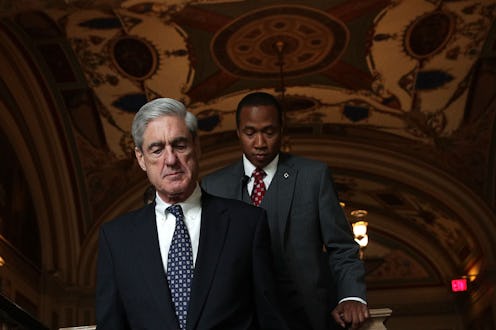News
The Russia Investigation Is Putting Together A Jury & That's Huge

Special Counsel Robert Mueller has reportedly impaneled a grand jury to investigate possible Russian meddling in the 2016 presidential election. The Wall Street Journal reported Thursday that the Washington, D.C.-based grand jury has been working on the matter for weeks, and its existence strongly implies that Mueller's Russia investigation is heating up, as opposed to ramping down.
Unlike trial juries, grand juries don't weigh in on a defendant's guilt or innocence. Instead, they convene before any charges have been filed in order to determine whether charges or an indictment should be filed. Prosecutors decide whether or not to impanel a grand jury, and they usually only do so when serious felony charges are a possibility.
Like a trial jury, a grand jury is presented with evidence, exhibits, and testimony from witnesses about matters pertinent the investigation. But the setting in which this unfolds is different. Trial juries meet with a judge, lawyers, the defendant, and the plaintiffs present, and the proceedings are generally open to the public. Grand juries, on the other hand, meet in secret, and aside from the prosecutor who pressed the charges, nobody else is usually present. Crucially, the potential defendants — that is, the person or people against whom charges might be pressed — are not allowed to attend grand jury proceedings.
The Journal did not report any specifics of the grand jury Mueller has impaneled, other than that it involved possible Russian interference in the 2016 election.
This is the second grand jury to be impaneled with regard to the Russia investigation. Mueller was brought on as special counsel for the Russia probe by Deputy Attorney General Rod Rosenstein, and shortly thereafter, he assumed control of a grand jury in Alexandria, Virginia, that is investigating former National Security Adviser Michael Flynn. The most recent grand jury, therefore, is almost certainly not focused on Flynn, given that the first one hasn't yet concluded yet.
Grand juries require only a supermajority, as opposed to a unanimous decision, in order to recommend an indictment, and prosecutors aren't required to act on a grand jury's recommendation. But when a prosecutor does file charges after a grand jury recommends them, the subsequent trial is usually faster, as the prosecution isn't required to demonstrate to the judge that they have enough evidence to go to trial.
The Journal notes that the location of the new grand jury — Washington, D.C. — will make it easier for Mueller and his team of 16 lawyers to attend its proceedings.
Read more about the Russia investigation
What Happens If The Donald Trump-Russia Allegations Are True?
Investigating If The Trump Administration Has Ties To Russia Shouldn't Be A Partisan Issue
What Exactly Does Special Counsel Mean?
Jared Kushner Defends Himself From Accusations About Russian Collusion
Ivanka Trump Lawyers Up For Russia Investigation
I'm A Russian Immigrant & Here's What The Trump/Russia Scandal Means To Me